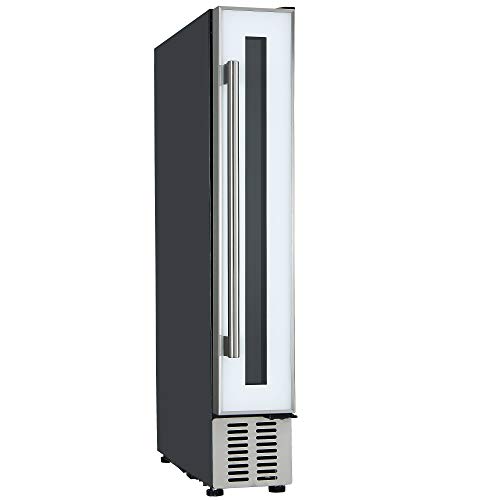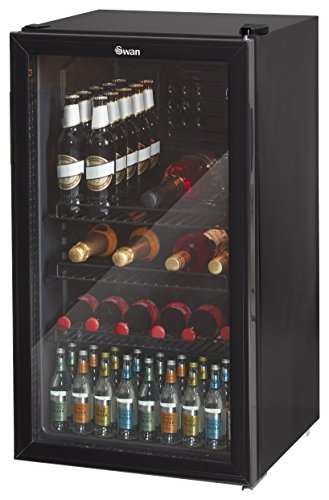3 Reasons 3 Reasons Why Your Beer And Wine Refrigerator Is Broken (And…
페이지 정보
작성자 Elden Harmon 댓글 0건 조회 3회 작성일 24-09-19 22:33본문
 Choosing a Beverage and counter wine fridge Refrigerator
Choosing a Beverage and counter wine fridge Refrigerator This dual-zone refrigerator is perfect to store and cool both wine and beer. It can be freestanding wine fridge or built-in and has a sleek seamless door that looks great in any space.
This dual-zone refrigerator is perfect to store and cool both wine and beer. It can be freestanding wine fridge or built-in and has a sleek seamless door that looks great in any space.While vibration is generally safe however, it can cause disturbance to the sediment of a bottle and cause complex chemical reactions that aren't visible. Over time, this can reduce esters and dull flavors.
Humidity Control
Humidity is the amount water vapor in air. It fluctuates throughout the day based on many factors. Temperature, precipitation and wind can all have a significant impact on the humidity levels. It is important to maintain the humidity level at a certain level for many reasons. Humidity can affect weather patterns, indoor air and even wine storage. The delicate composition of a wine is made up of numerous aromatic compounds that are sensitive to changes in humidity. When humidity is too high, it can affect the balance of these compounds and alter the taste of a wine. A wine refrigerator can help keep the proper humidity level to preserve the wine's flavor.
A wine fridge can also stop the deterioration of corks and provide an adequate seal. Corks may dry out when the humidity is too low. This allows oxygen to get into the bottle and accelerates the aging process. A wine refrigerator can be used to maintain an amount of humidity that is between 55% and 75%.
While a wine cellar is intended to last a long time, wine coolers can also provide ideal storage conditions for beer and wines. A lot of these units contain a space specifically for beer bottles, which means you can easily store your favourite lagers and craft beers in the same spot as your preferred wines. These units are designed to balance the humidity and temperature in order to avoid condensation, which can damage labels and packaging.
Most models include the hygrometer, which lets you regulate and monitor the levels of humidity in your wine cooler. You can also use a humidifier to boost the humidity in your wine fridge.
If you choose to use a dehumidifier, ensure that it is set up in a separate space from the wine fridge. This will stop the dehumidifier from absorbing any of the beer or wine that you store in the refrigerator. If you plan to keep your wine for a prolonged time, humidity control is essential. For a brief period of time, you may not notice any changes in your wine. However, over months or years the absence of humidity can significantly alter the taste of your wine.
Vibration Absorption
The vibrations inside the wine refrigerator could interfere with the natural aging process of the wines that are stored there. Even small vibrations can cause sediment to move into the bottle, triggering complex chemical reactions that will reduce esters and dull wine's flavor over time. All La Sommeliere units have a vibration absorption system that reduces the sound and tremors and allows your wine to age peacefully and in a proper way.
Despite the fact that wine refrigerators emit less noise than normal fridges, the fan and refrigerant circuits that are found in many units are still capable of making noise. It is crucial to follow the guidelines for clearance and put your wine cooler in a quiet space far from any other sources of noise.
Furthermore, it is recommended to regularly clean your wine cooler with an agent that is non-abrasive and to allow the unit to "air out" before filling it with bottles. This will minimize the amount of dust and dirt that may build up in the air vents.
If you notice that the wine fridge is making excessive noises it could be due to a malfunctioning compressor or electric fan. The compressor is usually located behind the wine refrigerator. If it is positioned unevenly or hits something behind it, it could shake itself free from its rubber mounts, which can cause loud humming noises.
The compressor wine cooler operates like a standard refrigerator by electronically compressing air molecules that decreases their temperature and then blowing them throughout the interior of the fridge. This kind of cooling is much more energy-efficient than other cooling methods like frost-free or evaporator refrigerators. The downside to compressor wine coolers is that they require more frequent repairs and tend to create more noise than other kinds of refrigerators. Because of this, many people opt to purchase thermoelectric wine coolers that do not use compressor systems.
Temperature Control
Like wine, beer has specific temperature requirements to help it keep its flavor at its peak. This makes it essential to select a wine and beverage fridge - Suggested Looking at, with adjustable temperature controls so you can store your drinks at the perfect serving and storage temperatures for each type. Dual-zone models are available with separate temperature zones for wine fridge large and beer bottles.
Generally speaking, the majority of beer styles prefer to be served colder than wine. The ideal temperature to serve a particular style will depend on the style and the method of making it. Wheat beers and pilsners ought to be served between 40 and 50 degrees Fahrenheit, while beer brewed with barleywines, IPAs and stronger ales are best served between 50 and 55 degrees Fahrenheit. If you let a beer get too warm, it will create a sour "skunky" smell that can make drinking unpleasant.
When it comes to wine, it is important to choose a refrigerator with an appropriate temperature range to accommodate your preferred whites, reds, and sparkling wines. Some wine refrigerators come with humidification features that prevent the cork from becoming oxidized and keep it in good shape. Some wine refrigerators even contain a special UV-blocking glass that helps prevent sunlight from affecting the wine and causing it to age prematurely.
A refrigerator's temperature control system can be powered by thermoelectric cooling or compressor technology. Compressor units utilize vapor compressors to reduce temperatures in the wine refrigerator, while thermoelectric models use electronic convection fan technology to circulate cool air through the refrigerator. Most fridges use the combination of these technologies to achieve the best results.
If you're looking to purchase a wine and beverage fridge wine storage that utilizes compressor technology, look for one that has shock pads that are vibration-resistant. The vibrations generated by compressor-based operations could disrupt the process of maturation of wine, and accelerate the process of oxidation.
There is a possibility of buying a wine-specific refrigerator. However, it might be more economical to buy an ordinary fridge or regular refrigerator that has a large interior and shelves that can be moved. You can customize the space so that it can fit a variety of bottles and cans, including wine, beer and other beverages.
Storage Options
If you are a fan of hosting parties and have a wide range of drinks to serve, consider a beverage cooler. These refrigerators can store cans and bottles of wine and beer along with other ice cold beverages like soda and water. They are available as freestanding or built-in models. Built-in models can be integrated under counters or into cabinets in kitchens that have little space.
Both kinds of fridges are available in a wide range of sizes and styles, making them suitable for most homes. Find models with sliding shelves to make it easier to find your favorite wines and brews. Some refrigerators feature soft LED lighting that can show off your collection in soft, gentle light. Some refrigerators even have the option of controlling humidity. This feature will prevent the formation of frost in your wine and beer bottles so that you can enjoy them with no worries.
A refrigerator that features dual zones will allow you to store your favorite wines at their optimal serving temperatures. You can also utilize the separate zones to keep your craft beer in storage as it often has similar optimal temperature ranges to the wine bottle. A dual zone wine and beer refrigerator can also hold larger bottles of spirits or beer than a regular household fridge.
The proper storage conditions can extend the shelf life of your wine and wine, so be sure you keep them in a well-ventilated space that has adequate light protection. The refrigerator should be kept free of dust, odors and other particles that could impact the flavor of your beverages over time.
If you're storing a large collection of wine and wish to preserve their quality, think about a cellar refrigerator. This kind of refrigerator is designed to store your wine rack and fridge for a long time. It operates at a slightly higher temperature than a wine fridge which allows your bottles to get older and develop their best taste. A cellar refrigerator also has a humidifier to keep the appropriate humidity. This ensures that the cork remains dry and impermeable. It also prevents external air and food items from your refrigerator from entering the bottle and deteriorating it over time.
댓글목록
등록된 댓글이 없습니다.